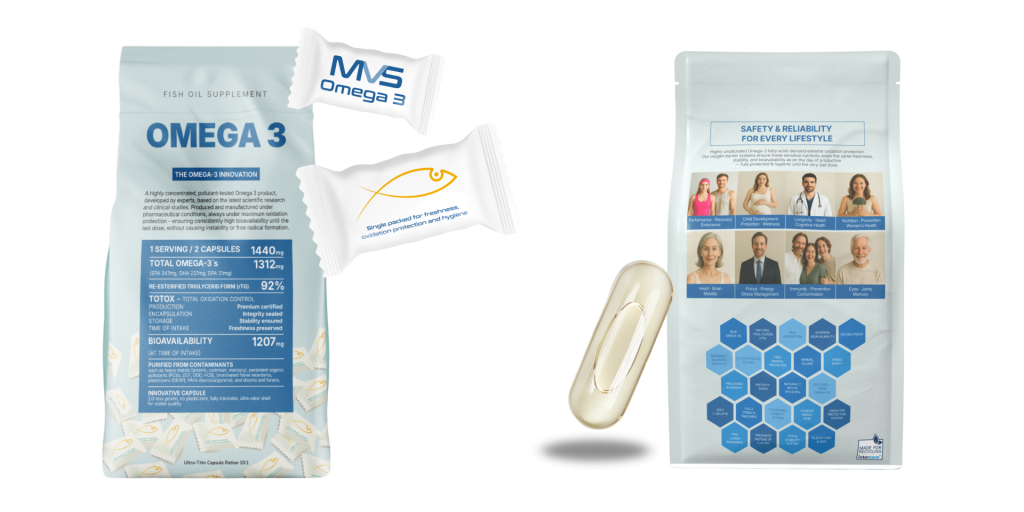Table of Contents
Omega-3 For Pregnancy: Introduction
Pregnancy is a period of profound physical and emotional change. A mother’s nutrition not only fuels her own body but also lays the foundation for her baby’s growth and lifelong health. Among the many nutrients required during this time, Omega-3 fatty acids — especially DHA (docosahexaenoic acid) and EPA (eicosapentaenoic acid) — stand out as some of the most important.
Omega-3s are essential for the development of the fetal brain, eyes, and nervous system, while also supporting the mother’s cardiovascular health, mood, and immune function. Yet studies consistently show that most women do not consume enough Omega-3 during pregnancy, largely due to low fish intake and concerns over contaminants.
This guide explores the latest science on Omega-3s in pregnancy (2023–2025), how much you need, and how to choose safe, effective supplements that ensure the best outcomes for both mother and baby.
What Are Omega-3 Fatty Acids? (Quick Overview for Mothers)
Omega-3s are essential polyunsaturated fatty acids, meaning the body cannot produce them in sufficient amounts — they must come from diet or supplementation.
- ALA (Alpha-linolenic acid): Found in flaxseeds, chia, and walnuts. Poorly converted into DHA/EPA.
- EPA (Eicosapentaenoic acid): Supports heart health, reduces inflammation, and contributes to mood balance.
- DHA (Docosahexaenoic acid): The most important Omega-3 in pregnancy, essential for the baby’s brain, eye, and nervous system development.
Key fact: DHA needs increase dramatically in the third trimester, when the baby’s brain and eyes are developing at their fastest rate.
The Role of Omega-3s in Pregnancy
During pregnancy, a woman’s Omega-3 stores are naturally drawn toward the growing fetus. DHA accumulates in the baby’s brain and retina, while EPA supports placental blood flow and nutrient delivery.
Without supplementation, mothers risk becoming depleted, which can impact both their own health and their baby’s development.
1. Benefits of Omega-3s for Fetal Development
- Brain Development & Cognitive Outcomes
- DHA is a major structural fat in the brain, making up 40% of polyunsaturated fats in the brain’s cortex.
- Higher maternal DHA levels are linked to improved memory, learning, problem-solving, and IQ in children.
- Visual Development
- DHA is also the primary fatty acid in the retina.
- Adequate intake supports sharper vision and visual processing in newborns and infants.
- Nervous System & Motor Skills
- Omega-3s aid in the development of the central nervous system, improving early motor function, coordination, and reflexes.
Long-term impact: Children born to mothers with sufficient DHA intake show better academic performance and attention span in school years.
2. Benefits for Maternal Health
- Reduced Risk of Preterm Birth
- Meta-analyses (2023–2024): Women supplementing with Omega-3s had a 42% reduction in early preterm births (<34 weeks) and a 17% reduction in preterm births (<37 weeks).
- Adequate Omega-3 levels help maintain uterine stability and reduce inflammation that can trigger early labor.
- Preeclampsia & Gestational Hypertension
- Omega-3s improve vascular function and reduce blood pressure, lowering the risk of preeclampsia.
- Clinical trials suggest DHA supplementation reduces incidence rates, especially in women with low baseline intake.
- Gestational Diabetes
- Omega-3s improve insulin sensitivity and reduce inflammation, supporting blood sugar balance during pregnancy.
- Maternal Mood & Postpartum Depression
- EPA is especially beneficial for mood regulation.
- Studies (2023): Omega-3 supplementation reduced the risk of postpartum depression, a condition that affects up to 1 in 7 new mothers.
- Cardiovascular & Immune Health
- Omega-3s reduce triglycerides, improve heart health, and balance maternal immunity — essential during pregnancy’s high physiological demands.
3. Long-Term Benefits for the Child
- Cognitive & Academic Outcomes
- Children whose mothers had higher DHA intake during pregnancy perform better in tests of reading, language, and IQ at ages 4–10.
- Reduced Allergy & Asthma Risk
- Omega-3s modulate immune responses, reducing the risk of allergies, eczema, and asthma in children.
- Lower Obesity Risk
- Prenatal Omega-3 intake influences fat metabolism in the child, lowering the risk of obesity and metabolic disorders later in life.
- Emotional Health
- Maternal Omega-3 intake is associated with lower risk of anxiety, hyperactivity, and ADHD in children.
-
How Much Omega-3 Do Pregnant Women Need? (2025 Guidelines)
– WHO: 200–300 mg DHA/day during pregnancy and lactation.
– EFSA: At least 250 mg EPA+DHA/day, with an additional 100–200 mg DHA/day in pregnancy.
– ISSFAL: 500–1000 mg EPA+DHA/day for optimal cardiovascular and fetal outcomes.Practical Dosage:
– Daily minimum: 300 mg DHA
– Ideal range: 500–1000 mg EPA+DHA (with emphasis on DHA)
– Higher needs: Women with low fish intake, multiple pregnancies, or high-risk conditions may require higher supplementation (under medical supervision).
Food vs Supplements
| Source | Pros ✅ | Cons ❌ |
|---|---|---|
| Food (Fish, Algae, Nuts/Seeds) | – Pregnant women are often advised to limit fish due to mercury, PCBs, and dioxins. – Plant ALA converts poorly into DHA. – Intake is often too low and inconsistent. | – Pregnant women are often advised to limit fish due to mercury, PCBs, and dioxins. – Plant ALA converts poorly into DHA. – Intake is often too low and inconsistent. |
| Supplements (Purified Omega-3) | – Deliver consistent, measurable DHA/EPA doses. – Purified from contaminants (safe for pregnancy). – rTG form ensures superior absorption. – Double packaging preserves freshness. – Convenient, daily intake. | – Quality varies between brands. – Some use poorly absorbed EE form. – Flavored oils may mask rancidity. |
Best approach: Combine safe fish and algae with high-quality, purified Omega-3 supplements to ensure both safety and adequacy.
-
How to choose the right Omega-3 supplement during pregnancy?
When selecting a supplement, expectant mothers should consider:
– Form: rTG (re-esterified triglyceride) = best absorption. Avoid EE forms.
– Purity: Must be free from mercury, cadmium, lead, PCBs, and microplastics.
– Freshness: Check TOTOX value (indicator of oxidation). Lower is better.
– Packaging: Double-protection (individually sealed capsules + oxygen-barrier pouch).
– Transparency: Look for third-party testing and certifications.
MVS Omega-3 — Setting a New Standard in Purity, Stability, and Bioavailability
Developed by MVS Pharma’s medical and pharmaceutical experts, MVS Omega-3 represents a new generation of scientifically designed Omega-3 supplements. With a 92% natural rTG structure, verified bioavailability of 1207 mg, and our proprietary T-TOX™ oxidation control system, it ensures exceptional purity, stability, and absorption. Each batch meets European Pharmacopeia standards and is tested for over 20 potential contaminants — setting a benchmark for transparency and trust in modern nutritional science.

Not all Omega-3 supplements are created equal. The more unsaturated and effective Omega-3 molecules become, the more sensitive they are to air exposure — making oxidation protection the single most critical factor for preserving both safety and bioavailability. Once oxidation begins, oil turns rancid, loses efficacy, and may even generate free radicals.
At MVS Pharma, this challenge defined our mission. We engineered MVS Omega-3 as a next-generation formulation designed for uncompromised purity, verified stability, and maximum biological usability.
Key Facts:
- Pharma-Standard Purification & Testing — each batch is verified to meet European Pharmacopeia standards and is screened for over 20 contaminants, including heavy metals, PCBs, dioxins, PAHs, and plasticizers.
- 90% Purified Omega-3 Concentration — delivering 1440 mg total oil with 1312 mg active Omega-3s (EPA 784 mg, DHA 518 mg) per serving.
- 92% Re-esterified Triglyceride (rTG) Form — structurally identical to natural fish oil for superior absorption (1207 mg bioavailable) and full physiological compatibility.
- T-TOX™ Total Oxidation Control System — exclusive German oxidation-management technology ensuring freshness and molecular integrity from production to the last capsule.
- Innovative Double Packaging — Individually Sealed Protection. Each capsule is individually sealed in an oxygen-free, double-wrapped container filled with argon gas. This advanced protective solution shields the sensitive Omega-3 oil from oxidation, light, and moisture — preserving the purity, stability, and freshness of each capsule until the very last dose.
- Ultra Thin Capsule Release 3.0™ — 2/3 less gelatin, no plasticizers, and >91% active ingredient load for transparency, purity, and optimized payload.
- Natural Tocopherol Matrix (α, β, γ, δ) — balanced antioxidant system calibrated to protect high-purity oil without destabilization.
The result is an ultra-pure, oxidation-protected Omega-3 supplement that maintains its natural structure, freshness, and full efficacy until the final dose — ensuring consistent support for cardiovascular, cognitive, visual, and immune health.
Summary: Omega-3 as a Cornerstone of Pregnancy Health
In 2025, the science is clear: Omega-3s are one of the most important nutrients during pregnancy.
They support:
- Baby’s brain, eyes, and nervous system development.
- Mother’s mood, heart health, and immune system.
- Reduced risks of preterm birth, preeclampsia, and postpartum depression.
- Long-term child benefits, from better cognition to lower allergy and obesity risk.
With most women falling short in dietary intake, high-quality, purified Omega-3 supplements in rTG form with oxidation protection are the safest, most reliable choice.
Disclaimer: As a service to our readers, MVS Pharma GmbH publishing provides access to our library of archived content – in our blog. Please note the date of the last review or update on all articles. No content on this site, should ever be used as a substitute for direct medical advice from your doctor or other qualified clinician.
FAQs
-
Why is Omega-3 important during pregnancy?
It supports the baby’s brain, eyes, and nervous system, while protecting maternal health.
-
How much Omega-3 should I take during pregnancy?
At least 200–300 mg DHA/day, ideally 500–1000 mg EPA+DHA. However, always consult a health-care expert on this matter.
-
Can I get enough Omega-3 from food?
Not usually. Most fish are limited due to mercury; supplements ensure safe, consistent intake.
-
Is Omega-3 safe during pregnancy?
Yes, if purified and tested for contaminants. Always choose high-quality brands.
-
What form of Omega-3 is best?
rTG form has the highest absorption rate. Avoid ethyl ester (EE) oils.
-
Can Omega-3 prevent postpartum depression?
Studies show high-EPA Omega-3s reduce the risk of postpartum depression.
-
What makes MVS Pharma Omega-3 safe for pregnancy?
It offers oxidation resistance, superior absorption in rTG form, full safety testing, and double protection packaging — ensuring purity and potency from production to consumption.
Sources:
- Database of Abstracts of Reviews of Effects (DARE): Quality-assessed Reviews – “The effect of maternal omega-3 (n–3) LCPUFA supplementation during pregnancy on early childhood cognitive and visual development: a systematic review and meta-analysis of randomized controlled trials”
- Database of Abstracts of Reviews of Effects (DARE): Quality-assessed Reviews – Effects of n-3 long-chain polyunsaturated fatty acid supplementation during pregnancy and/or lactation on neurodevelopment and visual function in children: a systematic review of randomized controlled trials
- Database of Abstracts of Reviews of Effects (DARE): Quality-assessed Reviews – “Pharmacologic treatment for postpartum depression: a systematic review”
- Database of Abstracts of Reviews of Effects (DARE) – “Effect of maternal n-3 long-chain polyunsaturated fatty acid supplementation during pregnancy and/or lactation on adiposity in childhood: a systematic review and meta-analysis of randomized controlled trials”
- Database of Abstracts of Reviews of Effects (DARE) – “Effect of n-3 long-chain polyunsaturated fatty acid intake during pregnancy on maternal, infant, and child health outcomes: a systematic review”


